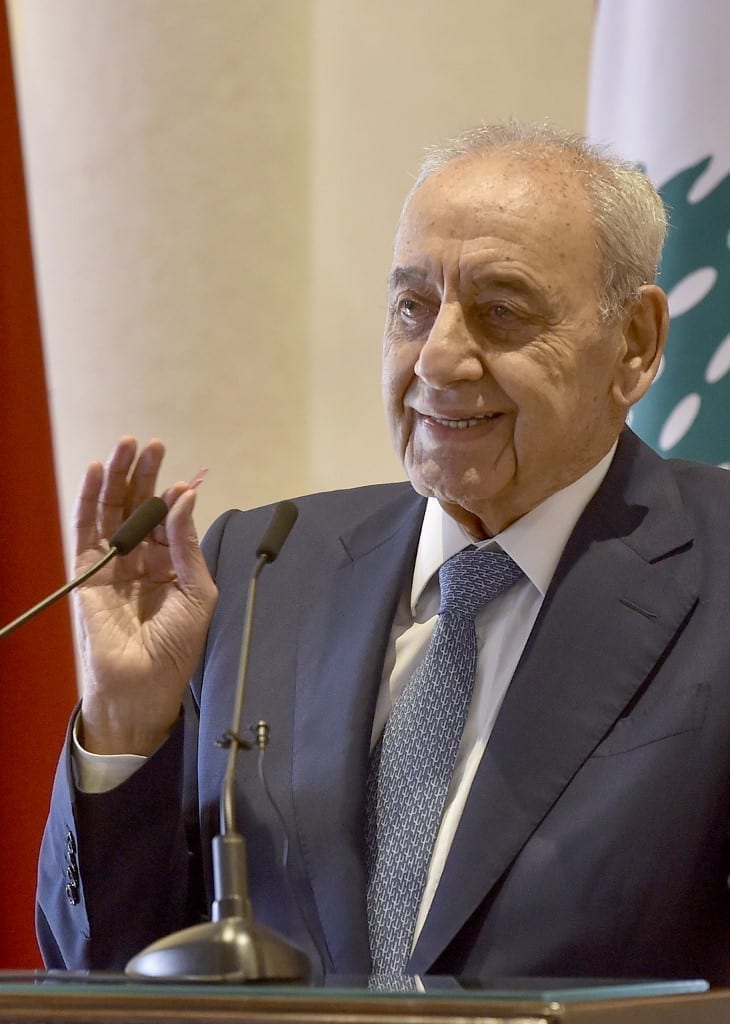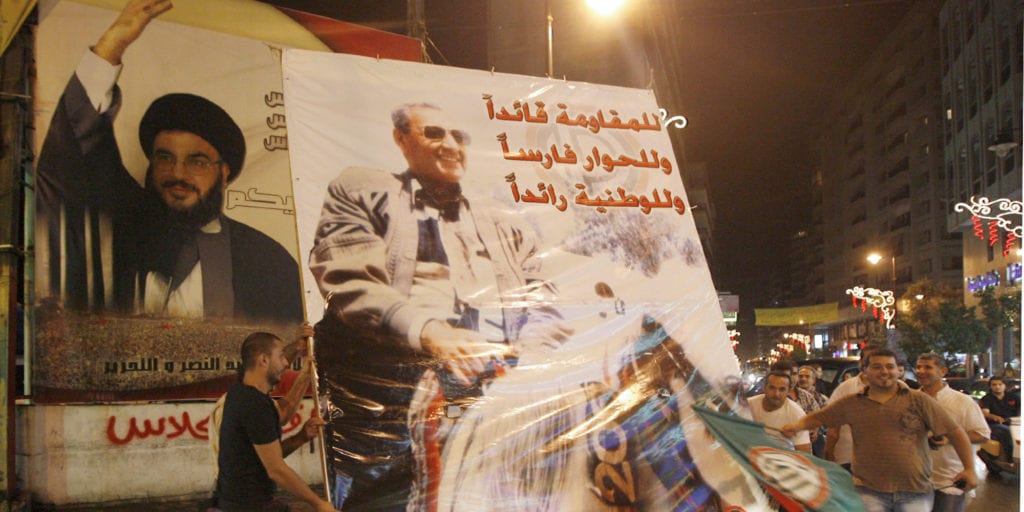
“The United States of America intends to put in every effort necessary with the two parties concerned (i.e. Lebanon and Israel), to help establish a positive and constructive atmosphere between them, in order to manage and conclude the above-mentioned negotiations as soon as possible.”
With this, Nabih Berri, head of the Lebanese Resistance Regiment – Amal, and the Speaker of the Parliament of the Taif Republic, defined the role assigned to the United States according to the framework agreement announced in Beirut. Berri mentioned that he has been looking into the file relating to the border demarcation, since it had been ascertained about a decade ago that there was oil and gas in commercial quantities in those border areas with Israel, out of concern for the country’s interests, until the very last drop.
In this way, Berri, the one who was delegated by the Secretary-General of Hezbollah, and who confidently enjoys the Shiite share monopoly in the Taif Republic, gathered all the Lebanese authorities together; he combined the authorities relating to legislation, implementation and popular power, leaving the army, the government and the presidency with the issue of implementation of these negotiations, as well as their technical follow-up. He simply wished them success with this opportunity to achieve the country’s strategic interests, one that enables it to pay off its swollen public debt.
As for Palestine, it was as if it was never on the map yesterday, but rather set aside… The agreement contradicts the statements of the “Loyalty to the Resistance” bloc, which have on more than one occasion considered that American mediation to be “dishonest” and not in the interest of Lebanon.
Berri’s leadership in the founding stages of negotiating, as well as his setting of the regulatory framework for it, conflicts with Article 52 of the constitution, which limits this task to “concluding and negotiating international treaties in agreement with the prime minister, and not concluding except after approval by the Council of Ministers.” This comes at a critical moment in Lebanon’s history, specifically after the Secretary General of Hezbollah’s recent statement that the main stumbling block that faced the formation of an Adib government lies in the attempt to eliminate the last executive powers of the president of the republic, according to the Taif constitution. However, the issue of this contradiction in powers between Berri and Aoun may have been resolved within the bilateral understandings between the party and the President’s sect.
In substance, Berri’s press conference indicated that they are paving the way to reach an understanding between two “neighboring” states, and that it will guarantees a peaceful solution to the border dispute between them in the interest of both parties. For example, during the twenty minutes of the live broadcast, Berri’s speech did not include phrases such as “the entity” or “the occupational authority”, unlike what the ‘literature of resistance’ speeches had always been like.
The dilemma is not in negotiating with an enemy over a border dispute, but in the organized rallying discourse that portrayed arms as the only solution to the conflict and to defend national interests in exchange for degrading the tools of diplomacy and international relations.
As for Palestine, it was as if it was never on the map yesterday, but rather set aside. In the same context, the agreement contradicts the statements of the “Loyalty to the Resistance” bloc, which have on more than one occasion considered that American mediation to be “dishonest” and not in the interest of Lebanon. Even Hezbollah’s Secretary-General Hassan Nasrallah, in a speech on February 2018, described the United States as “Israel’s lawyer,” identifying his party as the main force to defend and guarantee Lebanon’s interests, and put its defensive and offensive capabilities at the service of the Lebanese Supreme Defense Council. He also returned in a subsequent interview, on July 2019, to emphasize that “Israel is deterred and Lebanon is strong,” pledging to bring in a company to dig for oil.


The agreement, which was mentioned in Lebanon for the first time in Amal’s statement denouncing the sanctions against Minister Ali Hassan Khalil, comes within the general context of the agreements concluded by the US administration regionally to improve President Trump’s electoral position. This was evident in the US State Department’s statement, which emphasized the historical importance of the tripartite negotiation track, as the two countries asked them to play the role of mediator and facilitator for the negotiation process on the maritime borders. They claimed hope that this would be reflected in more stability, security and prosperity for the benefit of the two countries, and the Lebanese and Israeli citizens alike.
The great calamity is that the party has been in crisis since before October 17, for reasons related to its regional extensions, the sterility of the options for military intervention on more than one front, its transformation into a heavy material burden in Yemen, the struggle for influence with the Russians in Syria and its loss of the popular support in Iraq, providing the direct cover for the process of refinancing the plunder of Lebanon.
It should be noted that the Hezbollah leadership has now agreed to a diplomatic move that serves the same tactical goals that the Trump administration had achieved through the Abraham Accords, the same accords that the party and its supporters had demonized in the past.
Ultimately, we are today, witnessing an age-old habit for the axis of resistance and its solid bloc represented by the party, to show off a new “victory” to be added to the series of victories that have been accumulated since the moment of March 8, 2005. The problem is not in the negotiation process itself; that is a sovereign act that national authorities monopolize and use to support their country’s interests. However, the calamity is that the axis of resistance in Lebanon monopolizes the tasks of the Lebanese state and confines them to itself, and then uses them as tools to serve its local and regional agenda, which begins at the Fatima border gate and then doesn’t end with the last strategic positioning of the Iranian Revolutionary Guard, the most prominent executive arm of the metaphysical system in Iran.
The dilemma is not in negotiating with an enemy over a border dispute, but in the organized rallying discourse that portrayed arms as the only solution to the conflict and to defend national interests in exchange for degrading the tools of diplomacy and international relations. The great calamity is that the party has been in crisis since before October 17, for reasons related to its regional extensions, the sterility of the options for military intervention on more than one front, its transformation into a heavy material burden in Yemen, the struggle for influence with the Russians in Syria and its loss of the popular support in Iraq, providing the direct cover for the process of refinancing the plunder of Lebanon. Thus, the party, during the first anniversary of the October 17 revolution, provided the last lifeline to the Lebanese oligarchy and the thieving Lebanese regime, leading this counter-revolution with dedication; they want to ensure the quota system’s existence, and to preserve its interests locally and regionally.
On the other side of the border, the importance of the agreement is in the fact that it will constitute the basis for achieving peace and changing the rules of engagement and deterrence to ensure the continuation of economic operations in the two countries that agree to share their natural wealth. And the weapons will remain stored in villages and valleys, unless God wills, and the armistice agreement will return to the fore.
However, the final question remains, if the Abraham Accords expanded the geopolitical borders of Israel to the Persian Gulf, what would result from the Lebanese-Israeli border demarcation agreement?






